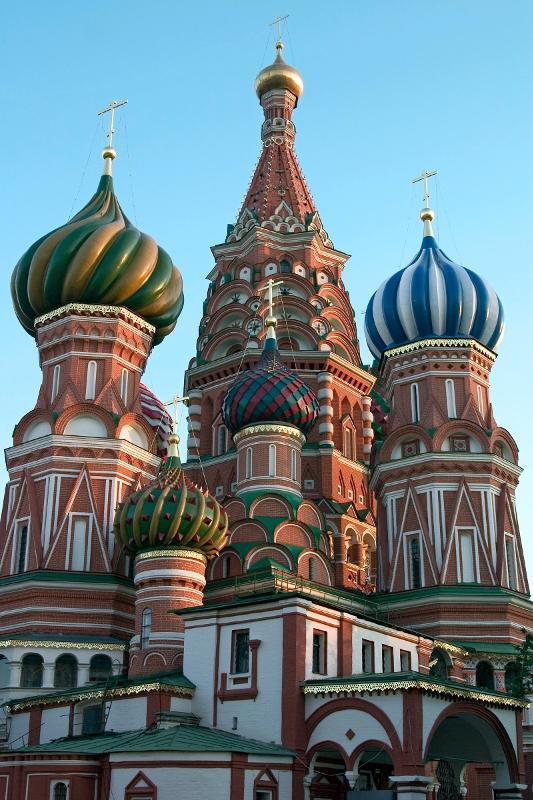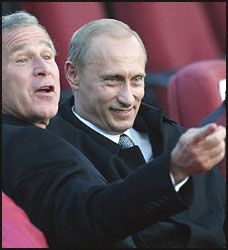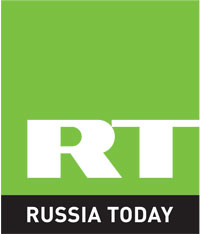From Russia with Spin
 St. Basil's Cathedral on Red Square, MoscowAll is not champagne and caviar in Moscow. Pro-Putin political forces are concerned that the West -- particularly the US -- is growing increasingly distant from President Vladmir Putin and the current Russian administration.
St. Basil's Cathedral on Red Square, MoscowAll is not champagne and caviar in Moscow. Pro-Putin political forces are concerned that the West -- particularly the US -- is growing increasingly distant from President Vladmir Putin and the current Russian administration.
One response has been to promote Russia as a willing and able partner in the war on terrorism. Unfortunately, according to a Washington Post article by Anna Politkovskaya, the cases of terrorism are often fabricated through confessions obtained through torture. She relates the condition of one Chechen prisoner who has not surprisingly confessed to all the charges "suggested" to him. "[He] is now severely disabled: Both his legs were broken under torture; his kneecaps were shattered; his kidneys badly damaged by beating; his genitalia mutilated; his eyesight lost; his eardrums torn; and all of his front teeth sawed off." Lest we think this goes on in secret, that is how he appeared in court.
Chechnya has been a thorn in the side of Kremlin strongmen since declaring its independence from Russia in 1991. Ironically, Putin's rise to power in 1999 was achieved in part because of his image as a tough leader that would be able to bring Chechnya back in line, by any means necessary. Chechens are still popular scapegoats for all types of unrest in the Caucasus region as well as in Russia proper. Despite the David and Goliath aspect of the struggle, Chechens have consistently managed to bloody the Russian government's nose while dancing out of reach, much to the Kremlin's chagrin.
The Dubrovka Theater Crisis
For example, on October 23, 2002, 40-50 Chechen rebels took over the popular Dubrovka Theater in Moscow and held several hundred people hostage. Not one to miss an opportunity to strengthen his position both domestically and on the international stage, Vladimir Putin stated that Al-Qaeda had infiltrated the Chechen rebel movement. Time magazine reported that Putin asserted that "the takeover was planned in 'foreign terror centers' by the 'same people' responsible for attacks like the recent bombing in Bali. That resonated well in Washington, where Putin has long argued he is fighting exactly the kind of radical Islamic terror that led to Sept. 11."
While there was justifiable international outrage about the taking of hostages -- and the execution of one by the rebels, the Kremlin hardly emerged unscathed. Russian security forces stormed the theater on the third day of the crisis, releasing a gas that was intended to immobilize the hostage takers, but instead killed at least 42 rebels and 120 hostages. While that outcome would have been bad enough as a public relations crisis for the Kremlin, it was made even worse by official refusals to identify the gas used in the raid, thus hampering medical treatment for the victims.
However, Lev Fyodorov, president of Russian's Union for Chemical Safety, acknowledged that the raid "was a military operation using non-lethal chemical weapons developed during the Cold War. They would have been intended for a military opponent." In the days after the "rescue," 600 of the former hostages remained in the hospital with gas poisoning. There was no rush to recover anyway -- Putin had instructed hospital staff not to release any of the patients in case one of the rebels had successfully disguised him- or herself as one of the innocent victims. In the days following the raid, civil suits were filed against the government by victims' families. A final slap in the face for the "good guys."
The Beslan School Massacre
In September 2004, Chechnya again embarrassed Putin and struck Russia in a most vulnerable place -- the elementary school in Beslan. Again, Russian security forces were caught off-guard when the approximately 30 hostage-takers took over the school on the first day of class. Again, Russian forces stormed the building where the hostages were being held, and again, there was a tragic loss of life -- in this case, more than 320 of the 1,000 hostages dying as a result.
While the Russians didn't seem to learn from past encounters, it would appear that the Chechens did. A local police officer reported that the hostage takers this time wore gas masks to avoid an ending similar to the Dubrovka theater episode in 2002.
At the time, Radio Free Europe/Radio Liberty questioned why Putin would seemingly shift blame away from Chechnya in statements like, "We are dealing not just with individual, isolated acts of terrorism. We are dealing with a direct intervention of 'international terror' against Russia, with a total, cruel, and all-powerful war, which again and again takes the lives of our fellow countrymen." Putin was determined to avoid the egg on his face -- and blood on his hands -- that Dubrovka produced.
Putin and the War on Terror
 George W. Bush and Vladimir Putin in one of their closer moments.Western criticism in the wake of the resolution of the events in Beslan focused on Putin's unwillingness to negotiate with the hostage takers. This armchair quarterbacking produced a stinging rebuttal from Putin in an interview with the Guardian Unlimited. "Why don't you meet Osama bin Laden, invite him to Brussels or to the White House and engage in talks, ask him what he wants and give it to him so he leaves you in peace? Why don't you do that?"
George W. Bush and Vladimir Putin in one of their closer moments.Western criticism in the wake of the resolution of the events in Beslan focused on Putin's unwillingness to negotiate with the hostage takers. This armchair quarterbacking produced a stinging rebuttal from Putin in an interview with the Guardian Unlimited. "Why don't you meet Osama bin Laden, invite him to Brussels or to the White House and engage in talks, ask him what he wants and give it to him so he leaves you in peace? Why don't you do that?"
Today it seems clear that Putin has been striving for several years to intentionally fold his Chechen quagmire into the larger war on terror. Internationally, it leverages certain latitude in his dealings with Chechnya -- the US and its allies in this effort are certainly in no position to criticize a hard-line crackdown on anyone labeled as terrorists. Were they not sufficiently maligned in the eyes of the international community, Moscow would run the risk of them being labeled freedom fighters, or something equally as damaging politically. Domestically, it also gives him some room to maneuver. After all, failing to supress a small, renegade province is one thing, but sharing the same failures in the war on terror with other powerful countries lessens the sting.
In addition, Russian nationalism suffered a serious blow with the dissolution of the Soviet Union in 1991. To add insult to injury, it was the tiny Baltic nations of Lithuania, Latvia, and Estonia that precipitated the avalanche that buried the Soviet dream. Whether it is conscious or not, Russians know that a seemingly insignificant region like the Baltics, or Chechnya, can change their lives immeasurably.
I have some personal knowledge of Russia, having lived in Moscow from 1993-94. During my time there, I witnessed a palpable sense of shame and anger that Russians felt about the Soviet progaganda they had been fed celebrating the alleged superiority of their political system and their quality of life. Almost overnight, Russians had to face the reality that theirs was not the socialist ideal that they had been striving for, but was in fact a slow-moving machine that was either unable or unwilling to provide for its citizens' most basic needs.
A Chill in the Air
The White House's spin doctors point to the expansion of both NATO and the European Union into Central and Eastern Europe as a sign that democracy is spreading and that countries, like plants, naturally lean toward the light. In Russia, however, the view is quite different. There is tremendous distrust of western encroachment into what has historically been their near-abroad, and even within the boundaries of their former empire.
Some perspectives couldn't be more disparate. In his April 3, 2006 Washington Post article, Peter Finn provides the view from Moscow. "Many U.S. officials hold up the administration of President Boris Yeltsin in the 1990s as imperfect but headed in the right direction; people here say those years were simply chaotic." Finn goes on to say that a major source of tension in US-Russian relations stems directly from successive US administrations becoming accustomed to the weak and futile Russian administrations of the 1990s. Despite Russia having regained some of it footing both domestically and abroad, the US is finding it hard to treat her as an equal in the relationship.
The Bush administration's evangelical fervor to spread its brand of democracy is hardly well-received in Russia's halls of power. Finn quotes Natalia Narochnitskaya, vice chairman of the international affairs committee in the State Duma, the lower house of Russia's parliament, and a member of the nationalist Rodina Party as decrying that "the messianism of American foreign policy is a remarkable thing." When Secretary of State Condoleezza Rice speaks, she said, "it seems like Khrushchev reporting to the party congress: 'The whole world is marching triumphantly toward democracy but some rogue states prefer to stay aside from that road, etc. etc.'"
Embracing Spin
 As CMD reported in the Weekly Spin of December 15, 2005, Russia recently launched a 24-hour a day English language satellite channel aimed at correcting the problem as the Kremlin sees it -- anti-Russian media bias in the West. Europe is not being neglected in this effort. Starting April 1, 2006, Russia expanded its satellite offerings with 18 hours a day of programming geared toward Germany, the Czech Republic, Slovakia, and Hungary, in partnership with a German broadcasting firm.
As CMD reported in the Weekly Spin of December 15, 2005, Russia recently launched a 24-hour a day English language satellite channel aimed at correcting the problem as the Kremlin sees it -- anti-Russian media bias in the West. Europe is not being neglected in this effort. Starting April 1, 2006, Russia expanded its satellite offerings with 18 hours a day of programming geared toward Germany, the Czech Republic, Slovakia, and Hungary, in partnership with a German broadcasting firm.
Even more recently, the pro-Kremlin Unified Russia party's website discusses the points of contention with Washington and advocates for a public-diplomacy campaign aimed at "protecting the political and economic elite of our country" from the criticism of the West.
Russians are also innovators though, and while spin might be a relatively new concept, they are already making it their own. Writer Victor Yasmann reports that Kremlin spin expert Marat Gelman has coined the term "museum diplomacy" to explain his idea of culture at the heart of Russia's public image campaign. He points to President Putin's opening of an exhibit of Russian art at New York's Guggenheim Museum as a prime example. Watch for an exhibit of matryoshka dolls coming to a museum near you.




